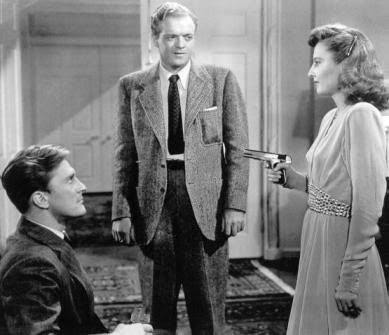
Directed by Lewis Milestone
Screenplay by Robert Rossen and Robert Riskin (uncredited), based on a story by John Patrick
Starring Van Heflin, Barbara Stanwyck, Lizabeth Scott, Kirk Douglas, Judith Anderson, Roman Bohnen, Darryl Hickman, Janis Wilson
IMDB Entry
The center of the film noir genre is not lighting or mood (though black and white photography is essential), but a story that's where an ambitious and ruthless woman leads a man to a tragic end. The template is Double Indemnity, where Barbara Stanwyck seduces Fred Macmurray into murder. A year later, Stanwyck was at it again, in The Strange Love of Martha Ivers*, one of the landmarks of the genre.
The movie starts with a long prologue. A young teen Martha Ivers (Janis Wilson) tries to run away from from her aunt (Judith Anderson), who keeps her under short leash as the heir of the richest family in Iverstown. Sam Masterson is helping when Martha is caught. Her sleezy tutor, Mr. O'Neil (Roman Bohnen), clumsily tries to ingratiate himself into the aunt's good graces in order to get his son Walter into Harvard. Martha hates her aunt; Walter and Sam both have crushes on Martha. When the aunt brutally kills Martha's beloved cat, Martha retaliates, killing her aunt. Walter backs up her story about an intruder being the real killer.
 The main story begins 18 years later. Sam (Van Heflin), now a war hero and professional gambler, inadvertently stumbles into town, crashing into a tree and wrecking his car. He runs into Toni Marichek (Lizbeth Scott), a woman with a past. He discovers that Walter (Kirk Douglas) and Martha (Barbara Stanwyck) are married. Walter is D.A. (and a massive alcoholic), and his wife had replaced her aunt as the richest and most powerful woman in town. When he is forced to talk to Walter in order to help out Toni, Walter and Martha fear he is in town to blackmail them, thinking he witnessed the murder. They have to take action.
The main story begins 18 years later. Sam (Van Heflin), now a war hero and professional gambler, inadvertently stumbles into town, crashing into a tree and wrecking his car. He runs into Toni Marichek (Lizbeth Scott), a woman with a past. He discovers that Walter (Kirk Douglas) and Martha (Barbara Stanwyck) are married. Walter is D.A. (and a massive alcoholic), and his wife had replaced her aunt as the richest and most powerful woman in town. When he is forced to talk to Walter in order to help out Toni, Walter and Martha fear he is in town to blackmail them, thinking he witnessed the murder. They have to take action.
I had not seen any of Van Heflin before watching the film. He's a great surprise as a screen presence -- part Cagney, part Bogart, tough and smart, but tender when it was called for. Lizbeth Scott, who shares with Stanwyck the title of "Queen of Noir," makes a very good damsel in distress; it's too bad the two of them didn't have more screen time together.
Stanwyck, of course, is brilliant -- ruthless but also damaged, cold but wishing she weren't. And Kirk Douglas is cast against type** as the meek and tormented Walter, who Sam describes as "a scared little boy."
Director Lewis Milestone is overlooked today, despite the fact he won two Oscars. He came to prominence with All Quiet on the Western Front, and directed a string of highly regarded films, including The Front Page*** Anything Goes, The General Died at Dawn, and Ocean's Eleven.***
The film suffers slightly from the Hayes Office, but is still a gem.
________________________________________________
*A title that probably would have been used to hint at some sort of sexual fetish today. Ah, the innocent days.
**Not that his type had been established yet; it was his first major role.
***Original version.



